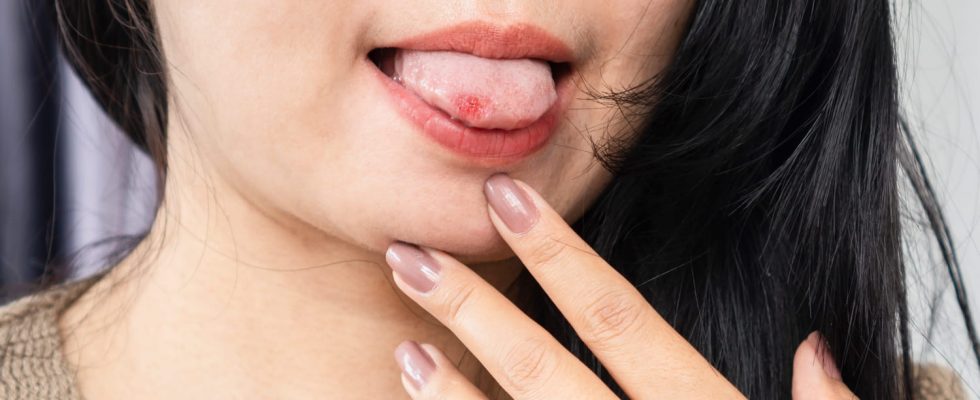We speak of ulceration, or erosion, when there is a loss of substance in the skin (cutaneous ulceration) or mucous membranes (mouth, genitals, etc.). These can cause sometimes intense pain. Photos and tour of the causes.
What is the definition of an ulceration?
An ulceration is a loss of substance: the superficial layers of the skin or mucous membrane thus forming a lesion. It’s a kind of wound that slowly widens. She can appear on the genital or oral mucous membranes, or on the skin, or be invisible, in particular on the digestive tract. These lesions, depending on their site of installation, are generally associated with underlying pathologies. Ulceration itself is not a disease, rather it is a symptom of a primary condition.
At the level of the skin, it is easily visible in the form ofa loss of substance, usually red, deepening. Concerning the mucous membranes, it can be seen when it touches the externalized mucous membranes, as in the oral cavity, or otherwise thanks to an endoscopic examination which uses a small camera.
Photos of mouth ulceration (tongue, lips)
What is the cause of a skin ulceration?
Skin ulceration may occur due to:
- A circulatory or arterial disorder. Blood circulation is reduced and the skin necroses, causing ulcers in the lower limbs.
- A bacterial or viral infection (STI, herpes, etc.). “Microbes such as staphylococci, streptococci or fungal infections attack the tissues”explains Dr. Nina Roos, dermatologist.
- Cancer. Cancer cells destroy healthy tissue to grow.
- A lack : especially vitamin C, causing scurvy.
- Local trauma. “Ulceration can occur following a shock, friction, a burn…“, says Dr. Roos.
- The appearance of bubbles and then ulcerations can also be seen in rare skin diseases.
What is the cause of a mouth ulcer?
They are multiple and can be caused by:
- Trauma or injury. “It can be a blow, a shock, an injury related to an unsuitable removable dental appliance or by friction of an orthodontic bracket on the cheek or labial mucosa.says Dr. Christophe Lequart, dentist and spokesperson for the French Union for Oral Health.
- A canker sore
- An infection. “Especially herpes, chicken pox or shingles or syphilis“, specifies Dr. Lequart.
- Cancer
What is the cause of genital ulceration?
Different causes can lead to ulceration:
- An infection. “herpes primarily, notes Dr. Odile Bagot, gynecologist, but also the varicella or shingles virus, the Epstein-Barr virus, a primary infection with HIV and syphilis“.
- Lipschütz’s ulcer”which looks like herpes but is not infectious”says Dr. Bagot.
- Bechet’s disease (oral and sometimes vulvar ulcers)
- A vulvar lichen sclerosus
- The genital localization of a dermatological disease (bullous disease for example)
- Cancer
What is the cause of digestive ulceration?
This lesion can be caused by:
- Helicobacter pylori infection
- Gastoesophageal reflux
- Taking aspirin or non-steroidal anti-inflammatory drugs
- A chronic inflammatory bowel disease, such as Crohn’s disease.
- Cancer
Who is the doctor specializing in ulcers?
There is no specialized doctor. It is recommended to consult the specialists of the fields of health. Thus, in case of oral problems, a dentist, a stomatologist or an ENT specialist can be consulted, while genital lesions will be treated by a dermatologist or gynecologistskin lesions by a dermatologist and digestive lesions will require the consultation ofa gastroenterologist.
The diagnosis is based on an interrogation and a complete clinical examination. The questioning focuses on the patient’s personal history, the taking of drugs that can induce these ulcerations and the symptoms experienced (pain, pruritus, etc.). The physical examination makes it possible to examine the lesion, their number and their topography. In case of digestive ulcerations, imaging is necessary. “Digestive endoscopic examination (gastroscopy, colonoscopy) is done using a camera mounted on a flexible tube, which the gastroenterologist passes through the mouth or the anus, most often under anesthesia”, explains the Pr François Mion, gastroenterologist, head of the digestive functional exploration department at the Lyon University Hospital. Biopsies may also be performed to clarify the origin of the ulceration.
What treatment to cure an ulceration?
“It is best to treat skin ulcers as soon as possible, as they can get worse and take longer to heal. recommends Dr. Roos. Classic local treatment combines cleansing with sterile saline solution and application of petroleum jelly to accelerate healing. We also treat the triggering factor when possible.. Sometimes, taking antibiotics and/or antifungals is necessary, associated with analgesics in case of pain. “Digestive ulcerations will be treated according to the cause found”, says Prof. Mion. In the event of cancer, the treatment may be surgical, supplemented, depending on the case, by chemotherapy and/or radiotherapy sessions.
Thanks to Dr. Odile Bagot, gynecologist, to Dr. Christophe Lequart, dentist and spokesperson for the French Union for Oral Health, to Pr. François Mion, gastroenterologist, head of the digestive functional exploration department at the Lyon University Hospital and Dr. Nina Roos, dermatologist.

